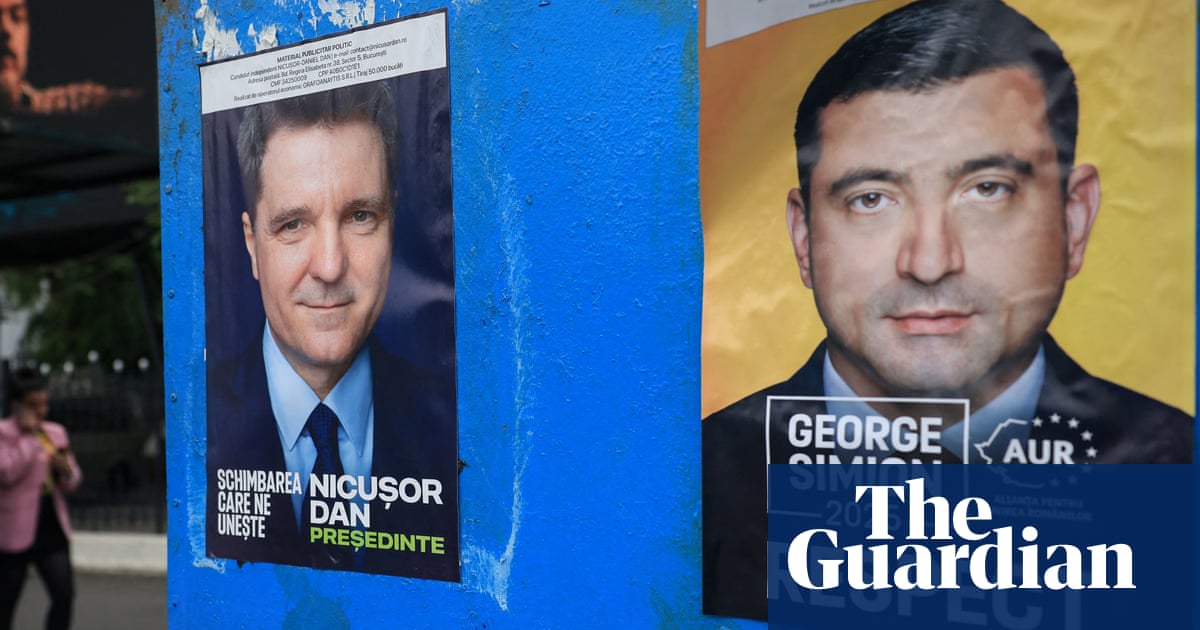Romanians have started voting in a pivotal presidential run-off that could radically alter their country’s strategic alignment and economic prospects, as voters in Poland andPortugalalso prepare to cast their ballots in a European electoral “super Sunday”.
The Romanian contest, the most consequential of the three, pits a brash, EU-critical, Trump-admiring populist against a centrist independent in a knife-edge vote that analysts have called most important in the country’s post-communist history.
George Simion, a former soccer ultra and ultranationalist agitator who sees his far-right AUR party as a “natural ally” of the US Maga movement,comfortably won the 4 May first roundwith a score of 41%, double that of the Bucharest mayor, Nicuşor Dan.
Recent polls have shown the gap between the two candidates closing, with one putting them neck and neck and another placing Dan – who has described the vote as a battle between “a pro-western and an anti-western Romania” – ahead.
“This election isn’t just about the president of Romania but about its entire direction,” said Siegfried Mureşan, a liberal Romanian MEP. Simion would “weaken Europe’s unity, undermine support for Ukraine, and benefit only Vladimir Putin,” he added.
InPoland, 13 contenders are vying to be the country’s next head of state in the first round of presidential elections, with the centrist mayor of Warsaw, Rafał Trzaskowski, a senior member of prime minister Donald Tusk’s Civic Coalition, the frontrunner.
Polls predict that Trzaskowski and Karol Nawrocki, a historian who is formally independent but has been endorsed by the former national-conservative Law and Justice (PiS) government, will advance to the second round, which is due on 1 June.
A win for the centrist would boost Tusk’s ability to push through his reformist agenda, which has been hampered by Polish presidents’ power to veto legislation passed by parliament. The outgoing president, Andrzej Duda, is a PiS ally.
Portugal, meanwhile, heads to the polls for its third snap general election in three years after the centre-right prime minister, LuísMontenegro, triggered and lost a confidence vote in parliament over questions about his family’s business activities.
Montenegro’s Democratic Alliance (AD) platform is forecast to finish first but fall short of a majority, and could struggle to form a government, especially if the Socialist party (PS), likely to finish second, keeps its pledge to oppose his legislative agenda.
Montenegro has vowed not to work with the far-right Chega, whose leader, former TV football pundit André Ventura, was hospitalised on Friday after twicecollapsing at rallies, but could be replaced as party leader with someone more Chega-compatible.
Simion’s win triggered thecollapse of Romania’s governmentof centre-left Social Democrats (PSD) and centre-right Liberals (PNL), and whoever wins will nominate the next prime minister and influence the formation of a new ruling coalition.
Sign up toThis is Europe
The most pressing stories and debates for Europeans – from identity to economics to the environment
after newsletter promotion
The vote is a rerun of last November’s ballot, won by a far-right, Moscow-friendly firebrand, Călin Georgescu, who was barred from standing again after the vote was cancelled amid allegations of campaign finance violations and Russian meddling.
Simion has promised to nominate Georgescu, who is under formal investigation on counts including misreporting campaign spending, illegal use of digital technology and promoting fascist groups, as prime minister if he becomes president.
Romanian presidents have a semi-executive role with considerable powers over foreign policy, national security, defence spending and judicial appointments. They can also dissolve parliament if MPs reject two prime ministerial nominations.
Analysts have said that since neither PSD or PNL would want a snap election with Simion’s AUR – the second biggest party in parliament – in the ascendant, a minority AUR-led government, backed perhaps by PSD, is a clear possibility if Simion wins.
Simion opposes further aid to Ukraine and has sharply criticised the EU’s leadership. While he insists he wants Romania to stay in the EU and Nato, he could ally with Hungary’s Viktor Orbán and Slovakia’s Robert Fico as another disruptive force.
“Simion’s election would mark a sea change in Romanian politics, creating significant risks to domestic stability, Bucharest-Brussels relations, and EU unity over Ukraine,” said Mujtaba Rahman of the political risk consultancy Eurasia Group.
The prospect of a Simion win has spooked markets and investors, causing the Romanian leu to plunge and major foreign business chambers in Romania have warned of a “rapid deterioration” in the business climate. Romania has the EU’s highest budget deficit.
